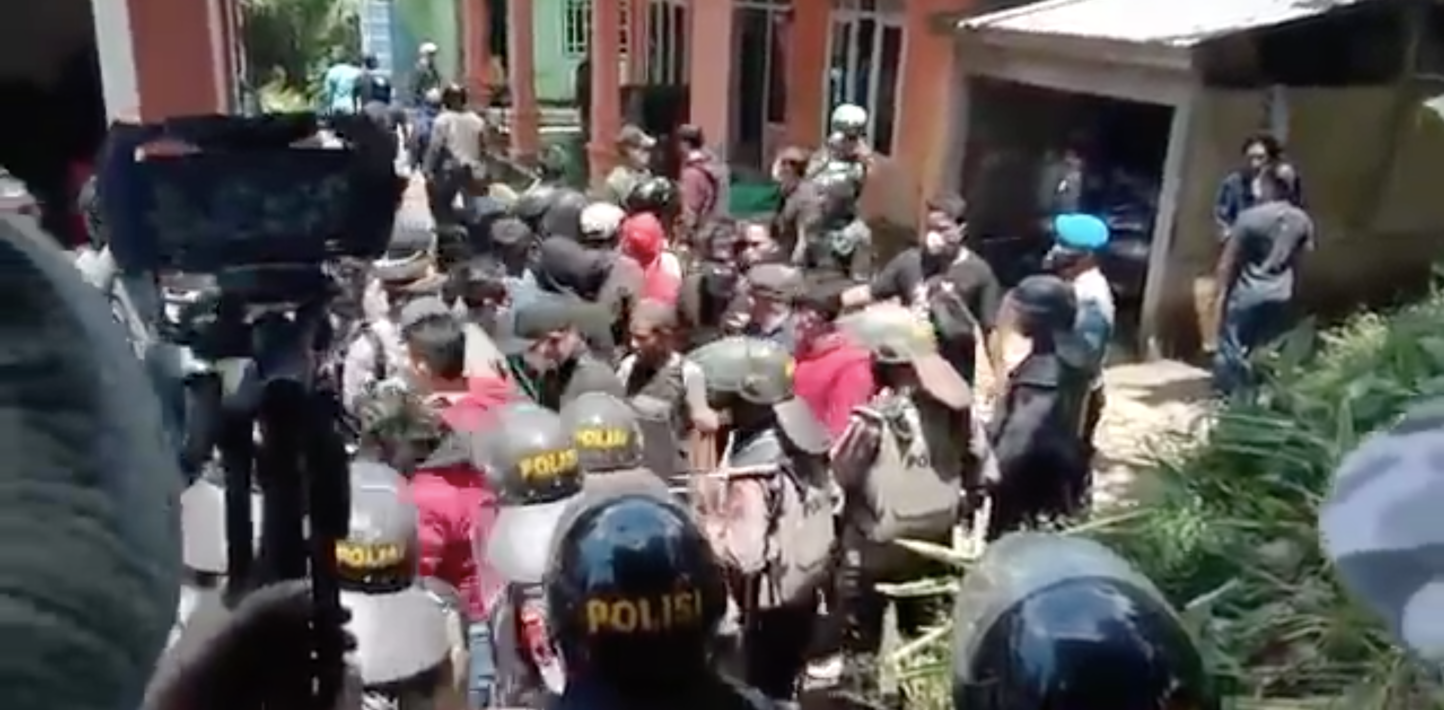Indonesian government and law enforcement officials must immediately halt the intimidation and harassment of the residents of Wadas Village, Central Java, that are opposed to a planned quarry in the area, Amnesty International Indonesia said today.
“The deployment of hundreds of security personnel and repressive actions taken by security forces in Wadas village are a form of intimidation and show a complete lack of respect for the villagers’ human rights,” Amnesty International Indonesia Executive Director Usman Hamid said.
“Wadas residents must be properly consulted about the construction of a quarry in their village. How can their informed consent be freely given if hundreds of police and soldiers enter the village every time there is an activity related to the quarry?”
Wadas Village is the site of a planned rock quarry that will supply stone for the construction of what is to be Indonesia’s tallest dam, the Bener Dam, in nearby Guntur village. President Joko Widodo has designated the dam a national strategic project.
Since Central Java Governor Ganjar Pranowo issued a decree designating the village as the site of the quarry in 2018, Wadas residents have staged peaceful protests to express their objections to the quarry. These objections largely stem from worries about the potential harmful impact that the quarry and the dam will have on the surrounding environment and, in turn, the livelihoods of the residents, who are mostly farmers.
On Monday, February 8 2022, hundreds of security personnel, made up of police, soldiers, and public order agency officials, entered Wadas Village with the stated purpose of safeguarding the land measurement process for the quarry conducted by the National Land Agency.
Some residents have said that the amount of security personnel, which included police in full riot gear, caused distress and fear in the village. Videos taken by residents also showed police arbitrarily detaining and beating some residents.
There were also indications that internet and cellular network access in the village was deliberately cut or slowed down. Indonesia’s Ministry of Information and Communication had previously limited internet and cellular network access in Jakarta in May 2019, following post-election protests and rioting, and in Papua and West Papua in August and September 2019, following anti-government protests. In June 2020, the Jakarta State Administrative Court ruled that the internet blackout in Papua was illegal.
According to information from the Yogyakarta Legal Aid Foundation (LBH), which represents several hundred Wadas residents, 67 people in Wadas were detained by police on February 8, including 60 local residents, one lawyer, and 66-year-old artist Yayak Yatmaka, who has actively campaigned for land rights since the 1970s.
All 67 people were released without charge on February 9. However, three among them have been named as witnesses in an investigation into an alleged violation of the Electronic Information and Transactions (ITE) Law involving the social media accounts under the name Wadas Melawan (Wadas Resists) that had posted several videos showing the police presence in the village.
Although Governor Ganjar has apologized for the arrests and promised to remove security personnel from the village on February 9, according to information received by Amnesty International from residents and local human rights defenders, there were still hundreds of police officers in or nearby the village on February 10.
“Authorities must immediately withdraw security personnel from Wadas Village and ensure that all intimidation tactics used against residents are halted,” Usman said. “Authorities should also promptly, thoroughly, transparently, independently, and effectively undertake an investigation into alleged incidents of excessive use of force and arbitrary detention and ensure that those suspected to be responsible are brought to justice in fair trials.”
“Authorities must uphold the right of Wadas residents to peacefully exercise their human rights and express their objections to the quarry.
“Unfortunately, this incident is not an isolated one. In April 2021, police arrested 11 Wadas residents, while nine were injured in clashes with police over the quarry,” Usman said. “Similar incidents have also occurred in other places across Indonesia that have been slated for the government’s national strategic projects. The Indonesian government must respect human rights principles. In several projects, unfortunately, the Jokowi administration has sidelined human rights.”
Other projects on the national strategic projects list included the New Yogyakarta International Airport, which resulted in the eviction of at least 2,700 families; the Kertajati Airport in West Java, which resulted in the eviction of at least 1,500 families; and the Mandalika tourism complex in West Nusa Tenggara, which United Nations human rights experts said: “involved aggressive land grabs, forced evictions of Sasak indigenous peoples, and intimidation and threats against human rights defenders”.
According to Amnesty International Indonesia data, in 2021 at least 44 Indigenous Peoples’ rights defenders and environmental activists faced attacks that include arrests, physical attacks, and intimidation.
“Indonesian government and law enforcement officials must understand that most people in rural areas cannot fulfill their social and economic rights, including the right to food, water, work and shelter, without access to land. Even their cultural rights rest on their ancestral land,” Usman said.
“The government must respect, protect, and promote the human rights of everyone, and fulfill the rights of local people in development by involving them in a meaningful, transparent and participatory way in the decision-making process.”

